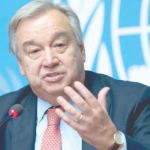Ethiopian Prime Minister Abiy Ahmed has issued a stern warning to any potential aggressors, advising them to “think 10 times” before attempting to invade Ethiopia. In his statement, he emphasized that any attack would be firmly repelled. While Abiy did not target any specific country with his remarks, they come amid escalating tensions with neighboring Somalia and Egypt.
Somalia has condemned a maritime agreement signed by Abiy’s government with Somaliland in January, labeling it an act of “aggression.” In response, Somalia has strengthened its military ties with Egypt. Somaliland, which declared independence from Somalia over 30 years ago, is considered by Mogadishu to be part of its territory.
Egypt, meanwhile, has long been in conflict with Ethiopia over the latter’s construction of a large dam on a Nile River tributary. Egypt is reportedly planning to send troops to Somalia following a military pact signed between the two governments last month.
During a televised address on Ethiopia’s Sovereignty Day, Abiy stressed that Ethiopia does not seek conflict but made it clear that the country is well-prepared for defense. “Those who are afar and nearby should know that we usually embarrass and repel those who dare try to invade us,” he said.
“Anyone intending to invade Ethiopia should think not just once but 10 times because one great thing we Ethiopians know is [how] to defend ourselves,” Abiy added.
The tension increased last month when two Egyptian C-130 military planes arrived in Somalia’s capital, signaling a boost in military cooperation. Reports suggest that Egypt plans to deploy up to 5,000 soldiers to join a restructured African Union (AU) force in Somalia by the end of the year, with another 5,000 to be sent separately.
The AU force has been in Somalia since 2007, assisting the government in combating al-Shabab, a jihadist group engaged in a violent insurgency.
Ethiopian troops are currently part of the African Union (AU) force in Somalia, but Somalia has announced that these troops will need to withdraw next year.
Meanwhile, Egypt has accused Ethiopia of jeopardizing its water supply from the River Nile due to the construction of the Grand Ethiopian Renaissance Dam (GERD) in the northern Ethiopian highlands, where 85% of the Nile’s waters originate. The GERD is Africa’s largest hydroelectric dam project, and Ethiopia views it as crucial for addressing its energy needs.



